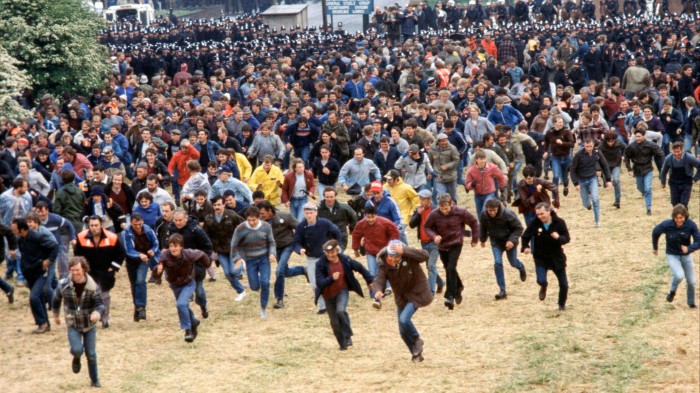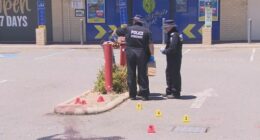Share this @internewscast.com
Unlock the Editor’s Digest for free
One sunny morning 41 years ago, I found myself in a field near the Orgreave coking plant in South Yorkshire, alongside a line of police officers. I was amidst a group of miners on strike, determined to halt the plant’s operations. As trucks began to roll in, the miners moved towards the police, with some hurling stones.
Orgreave became a pivotal moment in the 1984-85 miners’ strike, a conflict that culminated in Margaret Thatcher’s administration quashing the miners’ attempt to save Britain’s coal industry, resulting in the loss of over 180,000 jobs. The sense of betrayal experienced by the miners who lost their livelihoods remains vivid.
Last month, after years of advocacy, the government announced a new inquiry to “uncover the truth” about the events at Orgreave. Set to begin this autumn, it will investigate how 120 individuals were injured on June 18, 1984. Initially, 95 miners faced charges of riot and violent disorder, but these charges were later dropped amid allegations that the police had fabricated evidence.
The inquiry could potentially offer some emotional resolve, even though the events at Orgreave happened long ago and have been the subject of previous investigations, including a 2015 report following South Yorkshire police paying £425,000 in compensation to 39 miners. However, it is crucial that the inquiry recognizes that every conflict involves more than one perspective.
What has been termed the “battle of Orgreave” can be more accurately described as a series of skirmishes culminating on June 18. I was present on May 29 as a novice Daily Mail reporter; it was a day filled with projectiles, police charges by mounted officers, and 40 injuries. (It’s important to note that while the Mail’s biased reporting against the strikers is not justified, these observations are based on what I personally witnessed.)
Having moved up the hill from the designated press area to gain a clearer view, I was about 50 meters from Arthur Scargill, the president of the National Union of Mineworkers, who was attempting to lead a surge through the police ranks. As more objects were launched, he admonished his supporters: “We are not going to accomplish anything by throwing objects except injuring our own men,” I distinctly remember him saying.
I did not return on June 18, although I talked to several who were present for an article a decade ago, including former strikers. But it feels most plausible to me that similar pushing and frustrated stone-throwing by miners as lorries rolled up to the plant that day triggered a more ruthless counterattack from the police, who were by then better prepared.
Some campaigners prefer another story: that the miners stayed passive on June 18, apart from some ritual shoving against the line, before being attacked by the police without provocation. This was “not a battle but a rout”, in the words of the Orgreave Truth and Justice Campaign; television news only showed them throwing missiles first because the BBC actually reversed some footage.
I don’t believe it. The miners I knew in the strike were not pacifists and did not claim to be. They were fighting for their livelihoods, mostly lawfully but some, on occasion, fiercely. The entire strike was rough on all sides — strikers, non-strikers and police — and ended in a defeat that lingers to this day. It would be inhuman, all these years later, not to sympathise.
But it would equally be wrong for the inquiry to leap from blaming everything on the miners at Orgreave to blaming everything on the police, as moral retribution for the trauma the former suffered. History does not need to be sanitised to accept that an injustice was done and that some police officers, having faced violent attacks in previous weeks, lost control.
Some 6,000 police were there on June 18, including riot police in “snatch squads” for the first time in Britain. After several police charges into the crowd, during which miners were struck with truncheons, police commanders attempted to clear the field. That escalated into a chaotic showdown in Orgreave village and thence to charges of riot, an offence carrying a potential life sentence.
It is inexplicable that the police failed so badly, having come so thoroughly prepared. That is the biggest question for the inquiry: were they provoked to excess by weeks of the treatment that I saw, or did they act on orders from above? The battle of Orgreave had the desired effect for the Thatcher government: it proved the turning point in the miners’ strike.
That it became so brutal is indefensible, but not wholly surprising given the preceding build-up of violence. The striking miners were “outnumbered, out-armed and outdone”, one of those present that day once told me. I doubt whether the inquiry will come up with a better verdict.
john.gapper@ft.com





